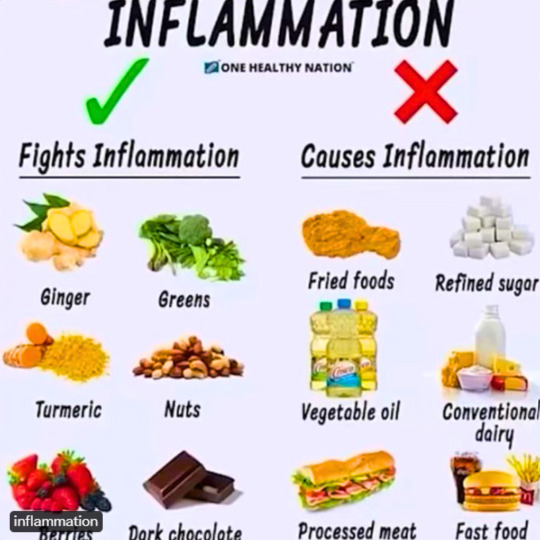#antioxidants
Link
Researchers found that a combination of proteins and antioxidants doubles the anti-inflammatory properties in immune cells. They hope to be able to study the health effects on humans.
Whenever bacteria, viruses, and other foreign substances enter the body, our immune systems react by deploying white blood cells and chemical substances to protect us.
This reaction, commonly known as inflammation, also occurs whenever we overload tendons and muscles and is characteristic of diseases like rheumatoid arthritis.
Antioxidants known as polyphenols are found in humans, plants, fruits, and vegetables. This group of antioxidants is also used by the food industry to slow the oxidation and deterioration of food quality and thereby avoid off flavors and rancidity. Polyphenols are also known to be healthy for humans, as they help reduce oxidative stress in the body that gives rise to inflammation.
Continue Reading
149 notes
·
View notes
Text

Danielle Roberts (American, 1991) - Midnight Antioxidants (2020)
50 notes
·
View notes
Text

33 notes
·
View notes
Text

Breakfast 🍓
Strawberries, Raspberries, Blackberries
Greek yogurt, splash of vanilla, granola, chia seeds
#kitchen witch#cottage witch#baby witch#green witch#witchblr#witchcraft#witch#beginner witch#baking#kitchen#breakfast#berries#antioxidants#Greek yogurt#granola#chia seeds#splash of vanilla
12 notes
·
View notes
Text
I don't know who needs to hear this*, but cooking doesn't destroy all antioxidants.
In fact, some antioxidants become more bio-avaliable after cooking.
Yes, antioxidants are lost to cooking water if you boil them and then drain off the water.
I suggest soup if you're really attached to boiling for some reason.
*actually I do, but I've already had enough arguments online today, and it's only 7am.
#cooking#antioxidants#health#basic nutrition#I kinda want to tag that group of people that thinks eating uncooked food is the only way to go#but they weren't even the ones saying this
49 notes
·
View notes
Text
Review: Missha Vita C Plus Spot Correcting & Firming Ampoule

Looking for a solution to dull and rough skin texture? Check out the Missha Vita C Plus Spot Correcting & Firming Ampoule! Formulated with 33% Vita C Liposome, encapsulating 99% pure Vitamin C and collagen, this ampoule rejuvenates dull and rough skin, promoting a brighter and firmer complexion.
Check out my full review and details here: Missha Vitamin C
Have you tried this ampoule before?
#skin care#kbeauty#korean skincare#kbeauty reviews#korean cosmetics#kbeauty blog#kbeautylover#skincare tips#dry skin#healthyskin#glowingskin#skincareproducts#vitamin c#vitamin c serum#missha#antiaging#antioxidants#dark spots#hyperpigmentation#dry skincare#dull skin#glass skin
8 notes
·
View notes
Text
Nervous System Wellness 101: How to Protect and Maintain Your Nerves

Caring for your nervous system is crucial for maintaining overall health and well-being. Here are some essential tips on how to take care of your nerve system:
1. Eat a Balanced Diet: A healthy diet plays a vital role in supporting your nervous system. Ensure that you consume a variety of nutrient-dense foods, including fruits, vegetables, whole grains, lean proteins, and healthy fats. These provide essential vitamins, minerals, and antioxidants that support nerve function and protect against oxidative stress.
2. Stay Hydrated: Proper hydration is essential for optimal nerve function. Drink an adequate amount of water throughout the day to keep your nerves hydrated and to facilitate the transmission of nerve signals.
3. Exercise Regularly: Physical activity not only benefits your muscles and cardiovascular system but also supports your nervous system. Engage in regular exercise, such as walking, jogging, swimming, or yoga, to improve blood circulation, reduce inflammation, and promote the health of your nerve cells.

4. Prioritize Sleep: Quality sleep is crucial for nerve cell regeneration and repair. Aim for 7-9 hours of uninterrupted sleep each night to ensure your nervous system gets the rest it needs to function optimally.
5. Manage Stress: Chronic stress can negatively impact your nervous system. Implement stress management techniques, such as deep breathing exercises, meditation, yoga, or engaging in hobbies you enjoy. Find what works best for you to reduce stress levels and support your nerve health.
6. Protect Yourself from Toxins: Exposure to environmental toxins can harm your nervous system. Minimize your exposure to harmful chemicals, pollutants, and toxins. Use natural cleaning products, avoid smoking and excessive alcohol consumption, and limit your exposure to pesticides and other harmful substances.

7. Maintain a Healthy Weight: Obesity and excess body weight can increase the risk of nerve damage and nerve-related conditions. Maintain a healthy weight through a balanced diet and regular exercise to reduce the strain on your nerves and support their optimal function.
8. Protect Your Head: Traumatic brain injuries can have a severe impact on your nervous system. Take precautions to prevent head injuries, such as wearing seatbelts, using helmets during sports or other activities with a risk of head injury, and practicing safe driving habits.
9. Stay Socially Active: Engaging in social activities and maintaining strong social connections can have a positive impact on your nervous system. Social interaction and support help reduce stress and promote emotional well-being, which in turn benefits your nerve health.
10. Consult a Healthcare Professional: If you experience any persistent or concerning symptoms related to your nervous system, such as numbness, tingling, weakness, or changes in coordination, it's important to seek medical advice. A healthcare professional can evaluate your symptoms, provide a proper diagnosis, and guide you on the best course of action.
Remember, taking care of your nervous system is an ongoing process. By adopting these habits and making conscious lifestyle choices, you can support the health and function of your nerve system, leading to overall improved well-being.
Boost Your Nerve System Health with These Fantastic Supplements

When it comes to maintaining a healthy nerve system, sometimes our bodies need a little extra support. That's where supplements come in! These fantastic helpers can provide the nutrients and compounds our nerves need to stay in tip-top shape. If you're looking to give your nerve system a boost, here are some of the best supplements you should consider. Let's dive in and discover the wonders they can do for your nerve health!
1. Vitamin B12: The Nerve System's Best Friend
Vitamin B12 is a true superstar when it comes to nerve health. It plays a crucial role in the formation of myelin, the protective coating around nerve fibers. By ensuring adequate B12 levels, you can support proper nerve function and reduce the risk of nerve damage. Consider adding a B12 supplement to your routine, especially if you follow a vegetarian or vegan diet, as B12 is primarily found in animal-based foods.
2. Alpha-Lipoic Acid: The Antioxidant Defender
Alpha-lipoic acid (ALA) is a powerful antioxidant that helps protect nerve cells from damage caused by free radicals. It also supports healthy blood sugar levels, which is important for nerve health. ALA has been shown to alleviate symptoms of neuropathy, a condition characterized by nerve damage. Including an ALA supplement in your regimen can provide that extra boost your nerves need to stay healthy and resilient.

3. Omega-3 Fatty Acids: Nourishment for Your Nerves
Omega-3 fatty acids, such as DHA and EPA, are not only beneficial for brain health but also for your nerves. These healthy fats provide the building blocks for nerve cell membranes and support proper nerve signaling. Incorporating an omega-3 supplement, like fish oil or algae oil, can help nourish your nerves and promote their optimal function.
4. Magnesium: The Calming Mineral
Magnesium is an essential mineral that plays a vital role in nerve function and relaxation. It helps regulate neurotransmitters and supports the transmission of nerve signals. Low magnesium levels have been associated with increased nerve excitability and muscle cramps. By adding a magnesium supplement to your routine, you can promote a calm and healthy nerve system.
5. Curcumin: The Golden Spice for Nerves
Curcumin, the active compound found in turmeric, has powerful anti-inflammatory and antioxidant properties. It has been shown to reduce nerve inflammation, relieve pain, and support nerve regeneration. Including a high-quality curcumin supplement can be a game-changer for your nerve health, providing natural support and relief.
Conclusion: Your nerve system deserves the best care, and these incredible supplements can provide the extra nourishment and support it needs. Remember, it's always a good idea to consult with a healthcare professional before starting any new supplements, especially if you have underlying health conditions or are taking other medications. So, go ahead and give your nerves the love they deserve by incorporating these fantastic supplements into your daily routine. Your nerve system will thank you with improved function, resilience, and overall well-being!

#healthy#health#nutrition#nutritious#healthcare#antioxidants#healthy diet#weight loss diet#low cal diet#diet plan#natural remedy#tips#latest news#headlines today news#news#world news#breaking news#headline news#brainstorm
16 notes
·
View notes
Text

These antioxidant-rich foods support your youthful skin by fighting free radicals and your body by combating inflammation and supporting your immune system ♥
#antioxidants#health#wellness#health and wellness#healthy food#beauty#skin#youthful#antiaging#immune system
4 notes
·
View notes
Text

Foods that are anti-inflammatory as well as foods that induce inflammation; consume meals that include omega-3 fatty acids, antioxidants, and other chemicals that have the ability to reduce inflammation.
#antiinflammatory#antioxidants#health#healthylifestyle#nutrition#wellness#vegan#guthealth#healthyfood#antioxidant#cbd
2 notes
·
View notes
Text
Food Diet for Cancer Fighters Your Path to Wellness
Discover the power of nutrition in the battle against cancer. Embrace a healthy journey to wellness.
#universitycancercentres#anticancerfood#anticancer#healthyfood#antioxidants#cancerfightingfoods#cancersurvivor
4 notes
·
View notes
Text
Do you know this?
Muscle Cramps? Take Magnesium
Can’t Sleep? Take Magnesium
Stressed out? Take Magnesium
Irritability? Take Magnesium
Anxiety? Take Magnesium
Headaches? Take Magnesium
Magnesium is involved in over 600 enzymatic reactions in the body (the number keeps going up!!). It’s a missing mineral from our diet that most people just aren’t getting enough of.
Make sure this is not missing from your diet by supplementing daily with LiveGood Ultra Magnesium Complex!
Did I mention it’s only $8.95 for 30 servings!?!?
Check it out; save money >> https://shoplivegood.com/healthgeneral

#supplements#supplement#vitamins#weightloss#wellness#heathylifestyle#holistic health#lifestylemedicine#sportsnutrition#superfood#nutrition#antioxidants#fitness#womenshealth#menshealth#protein#fatloss#vitaminsandminerals#weightmanagement#collagen#detox#collagenpeptides#sleep#vitaminD#magnesium#mineral#magnesiumglycinate#livegood#livegoodtour
2 notes
·
View notes
Text

These roasted capsicum & shiitake mushroom fajitas are so rich in flavour.
Not only that but contain so many essential nutrients like vitamin C, antioxidants protecting against cellular damage, cardiovascular disease and increase immunity.
Adding ingredients like these to some of your everyday meals gives them more flavour and truly boosts your overall health.
What you need ⤵️
X3 capsicums multi coloured
1 pack of shiitake mushrooms
2 tbsp taco seasoning
2 tbsp of olive oil
12 mini corn tortillas
1x can of black beans
Chipotle aioli (optional)
Coriander
Method:
Preheat oven 200°C.
Line baking tray with baking paper.
Cut vegetables and season with taco seasoning.
Place in baking tray and bake in oven for 15-20 minutes.
Heat tortilla's according to packet instructions.
Assemble tortilla filling: add roasted capsicum, shiitake, black beans, avocado, coriander, and chipotle aioli.
#nutrition#health#food#fitfam#healthy#vegetarian#foodislife#tortilla#antioxidants#lunchideas#dinnerideas#easymealprep
9 notes
·
View notes
Text

Sunday
#charcuterie#snacks#healthy#quick#protein#fruits#antioxidants#apples#strawberries#cheese#sunday#football
2 notes
·
View notes
Text
🌿 Did you know that asparagus is not only delicious, but also great for hormonal health? 🌱
🌿 Asparagus is packed with nutrients that can help balance hormones, including folate, vitamin E, inulin, glutathione, and saponins. 🙌
👉 Folate helps with hormone synthesis
👉 Vitamin E regulates estrogen levels
👉 Inulin promotes healthy gut bacteria
👉Glutathione protects cells from oxidative damage, &
👉Saponins have anti-inflammatory and antioxidant properties. 🌟
🍴 Add asparagus to your meals to support your hormonal health!
👩🍳 Try this delicious recipe to your meals and let thy food be thy medicine!
#manjiriayurveda#foodasmedicine#ayurvedarecipe#ayurvedafood#vediccooking#healingfoods#asparagus#hormonalhealth#healthylifestyle#eatyourveggies#healthyeating#nutrition#healthyhabits#eatwelllivewell#vegetables#fiber#antioxidants#hormones#glutathione#ayurveda canada#gut health#holistichealth#holistic food#holistic healing#ayurveda#digestion#healthy lifestyle#ayurvedacanada#ayurveda near me
7 notes
·
View notes
Text

What You Need to Know About Skin Care After Sun Exposure
Sun exposure can have both positive and negative effects on your skin. On one hand, it can provide vitamin D, boost your mood, and enhance your appearance. On the other hand, it can also cause sunburn, premature aging, and skin cancer. Therefore, it is important to know how to protect your skin from the sun and how to take care of it after sun exposure.
How to Protect Your Skin from the Sun
The best way to protect your skin from the sun is to avoid excessive sun exposure, especially between 10 a.m. and 4 p.m., when the sun's rays are the strongest. However, if you have to go outside during these hours, you should follow these tips:
- Wear sunscreen with at least SPF 30 and broad-spectrum protection, which can block both UVA and UVB rays. UVA rays can penetrate deeper into the skin and cause wrinkles, sagging, and dark spots. UVB rays can damage the surface of the skin and cause sunburn and skin cancer. You should apply sunscreen 15 to 30 minutes before going outside and reapply every two hours or after sweating or swimming.
- Wear protective clothing, such as long-sleeved shirts, pants, hats, and sunglasses. You can also look for clothes with UPF (ultraviolet protection factor), which can indicate how much UV radiation can pass through the fabric. The higher the UPF, the better the protection. For example, a shirt with UPF 50 can block 98% of UV rays.
- Seek shade whenever possible, such as under trees, umbrellas, or awnings. However, keep in mind that shade does not provide complete protection, as UV rays can still reflect from the ground, water, or sand. Therefore, you should still wear sunscreen and clothing even if you are in the shade.
- Avoid artificial tanning, such as tanning beds, lamps, or booths. These devices can emit UV rays that are even more intense than the sun and can increase your risk of skin cancer and aging. If you want to have a tan, you can opt for safer alternatives, such as self-tanning products or spray tans.
How to Take Care of Your Skin After Sun Exposure
Even if you follow the above tips, you may still experience some degree of sun damage after being outside. This is because the sun can affect your skin in various ways, such as:
- Dehydrating your skin, which can make it dry, flaky, and tight. This can also impair your skin's barrier function, which can make it more vulnerable to infections and irritants.
- Inflaming your skin, which can cause redness, swelling, pain, and itching. This can also trigger the production of free radicals, which are unstable molecules that can damage your skin cells and DNA.
- Pigmenting your skin, which can cause tanning, freckles, or dark spots. This is a result of your skin producing more melanin, which is a pigment that can protect your skin from further sun damage. However, too much melanin can also cause uneven skin tone and hyperpigmentation.
- Aging your skin, which can cause wrinkles, sagging, and loss of elasticity. This is a result of your skin breaking down collagen and elastin, which are the proteins that give your skin its structure and firmness.
To minimize these effects and help your skin recover after sun exposure, you should follow these tips:
- Wash your skin gently with a mild cleanser and lukewarm water. This can help remove any dirt, sweat, or sunscreen residue from your skin and prevent clogged pores and breakouts. Avoid using harsh soaps, scrubs, or hot water, as they can irritate your skin and strip away its natural oils.
- Moisturize your skin generously with a hydrating lotion or cream. This can help replenish the moisture that your skin lost from the sun and restore its barrier function. Look for moisturizers that contain soothing and healing ingredients, such as aloe vera, chamomile, oatmeal, or green tea. Avoid moisturizers that contain alcohol, fragrance, or retinoids, as they can dry out or sensitize your skin.
- Cool your skin with a cold compress, ice pack, or damp cloth. This can help reduce the inflammation, pain, and itching that your skin may experience after sun exposure. You can also use products that contain cooling and anti-inflammatory ingredients, such as menthol, cucumber, or calamine. Avoid applying ice directly to your skin, as it can cause frostbite or damage your blood vessels.
- Treat your skin with products that can repair the sun damage and prevent further harm. For example, you can use products that contain antioxidants, such as vitamin C, vitamin E, or niacinamide, which can neutralize the free radicals and brighten your skin tone. You can also use products that contain ingredients that can stimulate collagen and elastin production, such as peptides, growth factors, or retinol. However, be careful with using products that can make your skin more sensitive to the sun, such as alpha hydroxy acids, beta hydroxy acids, or benzoyl peroxide. You should use them at night and always wear sunscreen during the day.
- Hydrate your body internally by drinking plenty of water and fluids. This can help replenish the water that your body lost from sweating and prevent dehydration, which can affect your skin and overall health. You can also eat foods that are rich in water, such as fruits, vegetables, soups, or smoothies. Avoid drinking alcohol, caffeine, or sugary drinks, as they can dehydrate your body and worsen your skin condition.
Conclusion
Sun exposure can have both positive and negative effects on your skin, depending on how much and how often you expose yourself to it. To protect your skin from the sun and take care of it after sun exposure, you should follow the tips mentioned above and consult your dermatologist if you have any concerns or questions. By doing so, you can enjoy the benefits of the sun while minimizing its risks and keeping your skin healthy and beautiful.
#sun exposure#skin care#sun protection#sunburn#hydration#inflammation#pigmentation#aging#antioxidants#collagen#elastin
2 notes
·
View notes
Text
ISNTREE Green Tea Fresh Toner Review

Do you like Green Tea in skincare? This toner is infused with 80% green tea extract sourced from Jeju Island to help soothe and revitalize the skin. Designed with the needs of oily and combination skin in mind, it also features a patented blend, Anti Sebum P (HD), that helps regulate oil production and restore water-oil balance.
Read my full review and experience here: ISNTREE Green Tea Fresh Toner Review
What's your favorite product from Isntree?
#skincare#oily skin#kbeauty#korean skincare#kbeauty reviews#korean cosmetics#kbeauty blogger#kbeautylover#skincare tips#sensitive skin#acne prone skin#anti aging products#antiaging#anti ageing#antioxidants#wrinkles#cruelty free#vegan cosmetics#isntree#Green Tea Fresh Toner
7 notes
·
View notes